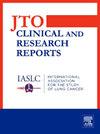Phase II Trial of Regorafenib and Oral Methotrexate in Previously Treated Advanced KRAS-Mutant NSCLC
IF 3.5
Q2 ONCOLOGY
引用次数: 0
Abstract
Introduction
There are no standard targeted treatment options for advanced KRAS-mutant NSCLC beyond KRAS G12C inhibitors. A computational model identified regorafenib and low-dose methotrexate as synergistic in preclinical models of KRAS-mutant NSCLC. This study evaluated the efficacy and safety of the combination in previously treated advanced KRAS-mutant NSCLC.
Methods
This single-arm phase II study included regorafenib 80 to 120 mg oral daily and oral methotrexate dose escalated to tolerability from 10 to 20 mg twice weekly during the first cycle. Both agents were administered on weeks 1 to 3 of each 4-week cycle. The primary end point was progression-free survival.
Results
In total, 18 patients with KRAS-mutant NSCLC were enrolled. Five patients received regorafenib at a 120 mg starting dose with four discontinuing due to toxicity; subsequently, 13 patients were treated at an 80 mg starting dose, with eight dose-escalating to 120 mg after the first cycle. Median progression-free survival was 3.7 months (95% confidence interval 1.8–8.6) and median overall survival was 10.4 months (95% confidence interval 5.2–30.3). The objective response rate was 16.7% and the 8-week disease control rate was 66.7%. Grade 3 treatment-related adverse events occurred in 11 patients, most often oral mucositis (n = 2) and asymptomatic lipase increase (n = 2). One patient developed asymptomatic grade 4 lipase increase.
Conclusions
Combination treatment of regorafenib and oral methotrexate in patients with KRAS-mutant NSCLC was limited due to toxicity, and the study did not meet its primary end point. Computational modeling may aid in repurposing therapeutic options though caution must be exercised with tolerability.
瑞戈非尼和口服甲氨蝶呤治疗曾接受过治疗的晚期 KRAS 突变 NSCLC 的 II 期试验
导言除了 KRAS G12C 抑制剂之外,目前还没有针对晚期 KRAS 突变 NSCLC 的标准靶向治疗方案。一个计算模型发现,在 KRAS 突变 NSCLC 的临床前模型中,瑞戈非尼和低剂量甲氨蝶呤具有协同作用。这项单臂 II 期研究包括瑞戈非尼(regorafenib)每天口服 80 至 120 毫克,以及口服甲氨蝶呤剂量升级至耐受性,第一周期为每周两次,每次 10 至 20 毫克。两种药物均在每个4周周期的第1周至第3周给药。主要终点是无进展生存期。结果共有18名KRAS突变NSCLC患者入组。5名患者接受了起始剂量为120毫克的瑞戈非尼治疗,其中4名患者因毒性停药;随后,13名患者接受了起始剂量为80毫克的治疗,其中8名患者在第一个周期后剂量递增至120毫克。中位无进展生存期为3.7个月(95%置信区间为1.8-8.6),中位总生存期为10.4个月(95%置信区间为5.2-30.3)。客观反应率为16.7%,8周疾病控制率为66.7%。11名患者出现了3级治疗相关不良反应,最常见的是口腔黏膜炎(2例)和无症状脂肪酶升高(2例)。结论由于毒性问题,瑞戈非尼和口服甲氨蝶呤联合治疗KRAS突变NSCLC患者的疗效有限,研究未达到主要终点。计算建模可能有助于重新选择治疗方案,但必须谨慎对待耐受性问题。
本文章由计算机程序翻译,如有差异,请以英文原文为准。
求助全文
约1分钟内获得全文
求助全文
来源期刊

JTO Clinical and Research Reports
Medicine-Oncology
CiteScore
4.20
自引率
0.00%
发文量
145
审稿时长
19 weeks
 求助内容:
求助内容: 应助结果提醒方式:
应助结果提醒方式:


